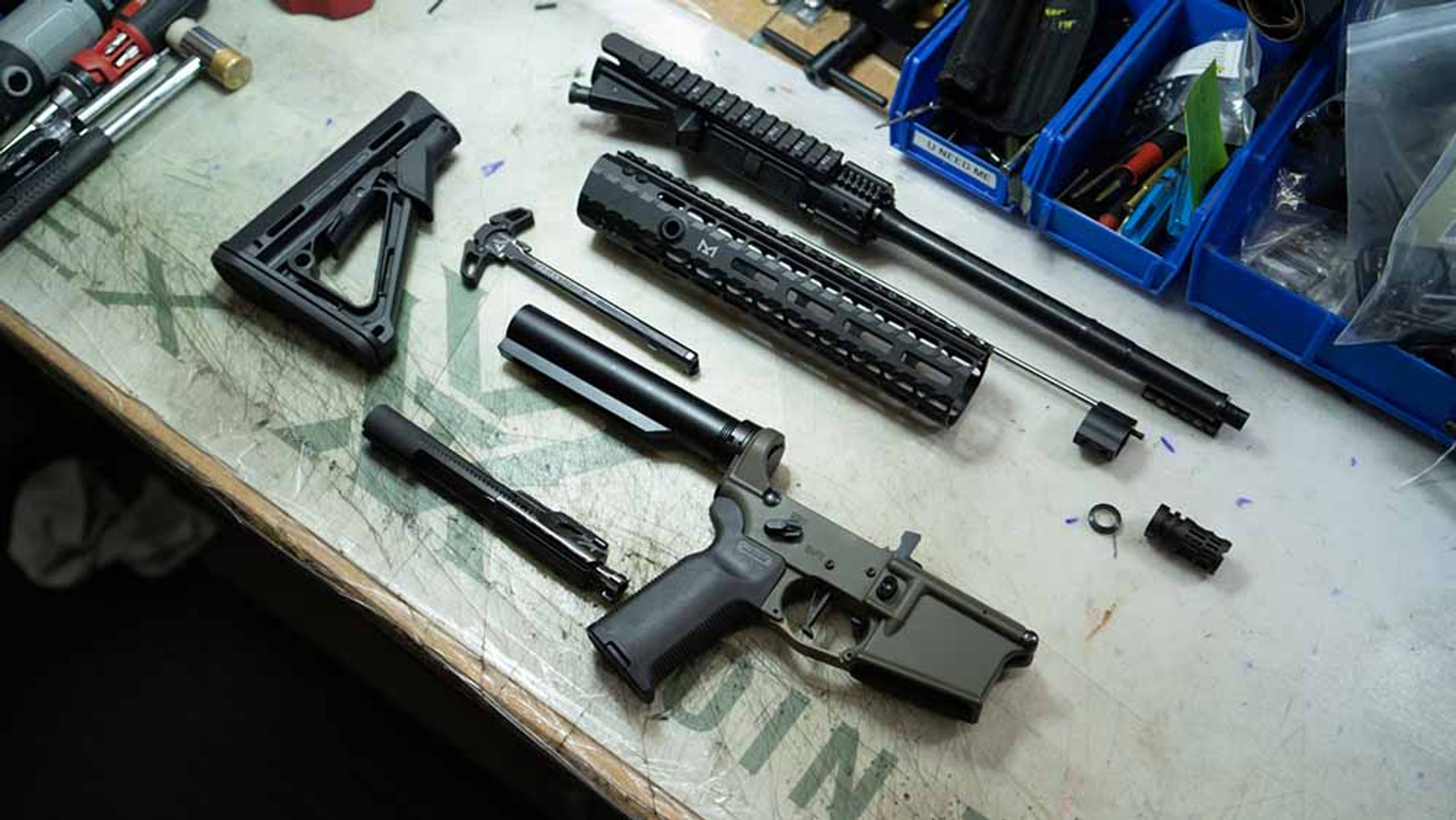How to Assemble AR15 Upper (Complete Guide w/ Pictures!)
Welcome to our complete guide for how to assemble a complete AR 15 upper receiver! If this is your first time, make sure you’ve got all your parts and tools ready for a smooth and efficient installation process. For those of you who have been around a block — this guide will still be a good refresher for you as well.
Tools Needed For AR 15 Upper Install
-Armorer’s wrench
-Mfc specific barrel nut wrench if necessary
-Allen keys and driver
-Anti seize lubricant
-Vise (extra)
-AR15 barrel vise block (extra)
Parts Needed for Complete AR15 Upper
-Upper receiver
-Dust cover
-Forward assist button
-Charging handle
-Bolt carrier group
-Locking barrel nut
-Handguard/rail
-Gas block
-Gas tube
-Muzzle device
Complete AR15 Upper Installation Steps
These are the installation instructions for how to properly install a complete AR15 upper. We’ll teach you how to do it in six easy steps so you never have to worry about this part of the build process again.
Step 1: Install barrel to upper receiver
Our first step is to mount the AR15 barrel to your chosen upper receiver. Regardless of brand, the concept of needing to tighten your barrel down to an upper receiver is the same no matter where you buy your AR 15 upper receiver or barrel from. However, the method of locking that barrel down may differ depending on whether you purchased a mil-spec upper receiver or if you bought one that has proprietary designs specific to its manufacturer.
In the photo examples above, you’ll see a mil-spec upper and an Aero Precision upper side by side for comparison. With the assembly on the bottom, you'll see that the mil-spec upper has a thread and an opening for a nub on the barrel to be set in place. Whereas, with the Aero Precision upper receiver, it comes with that meaty barrel locking system which comes with their ‘enhanced’ line of products (it’ literally part of the upper receiver).
Apply some form of lubricant or grease on the part of the barrel that will be connecting to the upper receiver and apply some on the threads as well. What you’ll want to look for is anti-seize with either aluminum or copper in it. Just make sure the formula is graphite free to prevent galvanic corrosion. Any number of places like online retailers or auto parts stores will have these lubricants or greases.

Once the barrel is inserted, mil-spec upper receivers use a barrel nut to be tightened down over the threads which can be partially screwed on by hand but this is where your armorer’s wrench comes handy. The Aero upper has the barrel go in just the same, however, it requires a proprietary wrench or tool for you to be able to lock that down properly. Unfortunately, that tool doesn’t come for free and needs an additional purchase.
Step 2: Install Gas System
To install the complete gas system, make sure you have all the parts ready and together — which is really just the gas block and a gas tube. The gas block retains the gas tube by simply using a roll pin. Make sure you hammer that in carefully and use a roll pin punch if you have one for best results. Using the Real Avid Smart Bench Block is extremely helpful for this step.
In the photos below you’ll see the gas block setup we have for the new AR15 build which is utilizing an adjustable gas block. This means that this build will be able to adjust the amount of gas flowing back into the receiver pushing back the bolt carrier group so that it can properly cycle back and forth.

Our mil-spec upper assembly is using a fixed gas block which means what you see is what you get. If you wanted to tune this rifle you’d have to rely on changing out the muzzle device or the buffer spring and weight. But you can really fine tune the settings on your rifle with an adjustable gas block which will help to create a smoother and softer shooting experience.

Once you have the gas tube secured to the gas block, slip it over the barrel and into the upper receiver. There should be a small right above the barrel nut to receive the gas tube. Now how do we secure this? Well, take a look at the bottom of the gas block. There are two set screws that you’ll have to tighten so that it clamps down around the barrel. Apply a drop of Blue Loctite to each screw, go in and out once or twice before really torquing it down. We want this tight, but we also don’t want to break off the heads of our screws.
Step 3: Install Handguard
Next, is the AR15 handguard which is also often interchangeably referred to as the ‘rail.’ Both terms are accurate, as in this guide we’re using two different M–LOK rail systems which protect your hand from the barrel which can get extremely hot after firing enough rounds. Simply slip on the handguard over the barrel and gas system and tighten down the respective screws. On our mil-spec upper there are three screws that are used to secure the rail to the upper receiver. The enhanced Aero Precision upper has eight screws.
Step 4: Install muzzle device
Now that the most difficult components of the AR 15 upper have been installed, next up is the muzzle device. We’re using the Aero Precision Gamma muzzle brake which features hybrid designs that both muzzle brakes and compensators alike will have — all which effectively alleviates some perceived felt recoil and greatly reduces muzzle rise when firing.
Obviously we have to pay attention to the final orientation of the muzzle device when installing it on our barrel. However, where you start threading it on may not be where you end up. For example, if you start with the correct orientation at the 12 o’clock position, by the time you reach the bottom of the threads you might be stopping at 3 o’clock and after torquing it down with the armorer’s wrench, maybe the final position is with the muzzle brake’s top facing at the 9 o’clock direction. So be patient, this will likely take a few tries to get it right.
However, AR15 barrels and muzzle devices will typically come with a crush washer and or thin spacer to help with either headspacing or in this case, positioning the muzzle device correctly. Do not use two crush washers as that would be too thick for the muzzle device to properly clamp down on. If using a spacer, slide that onto the barrel first, then the crush washer and finally your muzzle device.
Step 5: Install Dust cover, charging handle and bolt carrier group
Our upper receiver came with a pre-installed dust cover but most of the time stripped upper receivers will not come with a dust cover already installed. To install your dust cover first make sure you have the three parts needed which are a ‘C-clamp, a bar and retaining spring which has two sides, a short end and a long end. The short end points towards the upper receiver and the longer end rests on the dust cover itself. So keep that in mind before you install the bar through holes on the upper receiver and the dust cover.
Start by pushing the bar through the upper receiver’s holes (make sure the side of the bar with the indent goes in first) and have it only go halfway through the dust cover so you can easily get it through the spring as well. Once you’ve done this, rotate the long end of the spring downwards as you push the bar all the way through the next hole belonging to the upper receiver. When the indented part of the bar passes through, use the C-clamp to attach onto it which will hold the bar, and therefore the whole dust cover, in place.
AR15 charging handle and BCG
Flip the upper receiver upside down so you can see the indent on the inside of the receiver so that the charging handle can slip into the channel made for it. Before pushing the charging handle all the way in, drop the bolt carrier group into it as well (gas key side first). Once it’s seated properly you should be able to push the BCG and charging handle completely into the upper receiver simultaneously as shown in the images above.
Step 6: Install Butt stock
It’s the icing on the cake really — the butt stock. I like to install this part at the very end just because it’s so satisfying to put that on and then step back to see the complete and final product, a newly built AR-15. On the practical side of things, some butt stocks might get in the way or take up too much space on your workbench while working installing AR15 parts and accessories.
For this build, we’re using a Magpul CTR carbine stock. If you’re unfamiliar with Magpul butt stocks they’re all installed in the same way: While squeezing the locking lever, pull the metal pins downwards just a bit more so that you can clear the longest length setting on the buffer tube (think of it like notches on a belt). After clearing that you should be able to adjust the CTR stock freely into any of the six positions on the buffer tube.
Build your AR15 complete upper with 80 Percent Arms today!
That’s it, congratulations! You’ve now completed your first 80 percent AR15. All that’s left to do is to mate the upper and lower receivers together via the two takedown pins. If you’ve been on the fence about building and milling out your first 80 lower, we have all the guides, blogs, and video tutorials you need to get you underway. If you feel that you’ve gotten stuck somewhere along the way, free free to ask our legendary customer service team as they’d be happy to help and answer your questions.



 Back to List
Back to List